- Home
- Jeremy Robinson
Project Maigo Page 4
Project Maigo Read online
Page 4
“You’ve been trying to find evidence against me all year,” he says. “Sounds like a vendetta to me.”
I nearly deny it, but it’s clear he knows better. I suppose when you work for the most high-tech company in the world, even government secrets can’t stay hidden for long. Which makes me wonder what else he knows. Man, I’ve really got to get this guy in an interrogation room.
“You’re a murderer,” I say, stepping closer.
“When I killed, it was under the orders of a United States general.” Endo stands up straight, taking his weight off the container. “When you brought Tilly to the edge of that roof and offered his life to Maigo, you weren’t under orders. He hadn’t been convicted or sentenced. According to the law, you took an innocent man and had him executed.”
Two things stop me in place. First, I agree with him. Technically, I killed Tilly, or was, at least, an accessory to his murder. I just don’t feel bad about it, because he murdered his wife and daughter, and my taking the law into my own hands spared the city from further destruction. Second, Endo is the only other person I’ve ever heard call the monster by the name Maigo.
His grin returns. “We want the same thing: to protect the world from further destruction. We’re just going about it differently.”
“How’s that?” I ask, stepping forward again, closing to within striking distance.
“You think brute force will stop her,” he says, and he’s wrong about that. I’m not sure anything short of a nuke could stop her, and I’m entirely against that option, though some in Washington disagree. “I believe in a more subtle approach,” he says.
Going for the unsubtle approach, I take a swing, hoping to catch him off guard. No matter how experienced a fighter he is, one good clock to the head will drop him. If only the man didn’t have the reflexes of a mantis shrimp, it might have worked.
Ducking my punch, which overextends my body and leaves me open for a painful counter-attack, Endo simply leaps up and slaps me across the side of my head, striking my temple with his open palm.
He jumps back out of reach, standing casually once again, a smile on his face.
I groan, exasperated by his cocky attitude and the realization that he’s just screwing around. “Seriously?”
“Like I said, you’re going about it all wrong,” he says. “It’s not about brute force. It’s about intelligence. Knowledge. Technology.”
“Shut up, Steve Jobs,” I grumble, clenching my fists. “Sometimes a little brute force goes a long way.” I take a step toward him, trying to visualize my attack. My fist is about half the size of his head. Just one punch. One punch.
He takes a step away, and I think I’ve got him. He sees how pissed I am.
Nope.
He just wants to get in the last word.
“It’s about control,” he says, before tapping what looks like a small Bluetooth phone attached to his right ear. “Stop.”
The world goes wonky. I’m still aiming for his head, but my mind is telling me he’s floating away, hovering smoothly over the ground, a fixed distance from me. But that’s not the case. The truth is worse. He’s not gliding away, I’m no longer moving.
“Sit,” he says. “Don’t talk.”
I plop down onto the damp concrete, sitting in a rainbow swirled oily puddle.
I can move my eyes, but otherwise, I have no control over my own body.
He steps up in front of me, my life in his hands. With a broad smile he taps my head with his finger. “Control the beast. Save the world.” He steps back. “I hope the next time we meet, it will be under different circumstances. Our goals are aligned. Maigo is important. To both of us.”
I want to hurl four letter words at him, but I’m a statue.
He glances to the side, like he’s just heard something. He steps between a pair of containers and slips away. Ten seconds later, Collins appears. She looks unharmed, but pissed.
“What are you doing?” she asks, clearly annoyed.
When I don’t respond in any way except to stare at her, her mood shifts from anger to concern. She slows her approach. “Are you booby trapped or something?”
I move my eyes back and forth, doing my best to communicate a ‘no,’ and I turn my eyes toward my left temple, where Endo slapped me.
She looks at the side of my head and squints. “The hell?” Leaning in close, she reaches out, takes hold of something and tugs. A stinging pain lances through my head and I shout, “Oww!” Then I’m immediately relieved, because I can talk again.
I rub the side of my head, and my hand comes away with just a little bit of blood. Collins holds out a dime-sized device. Its surface is smooth black, but three golden prongs, tinged with my blood, extend from its side.
I’m about to ask what it is, when the thing starts to smoke. Collins flinches in pain and yanks her hand away. A jet of flame shoots from the side of it, but extinguishes as the device lands in a puddle. I quickly pick it up, hoping the fire and water haven’t completely destroyed the technology inside.
“What did it do to you?” Collins asks, helping me to my feet.
“Controlled me,” I tell her. “I would have done whatever he asked.”
“You’re okay?”
I nod. “He...just wanted to talk.”
“Be glad he didn’t leave you doing the running man dance.”
I smile, but the attempt at humor doesn’t really lift my spirits. “I know what Zoomb is after.”
She waits.
“Control…” I tell her with a frown, “of Nemesis.”
6
“We are now live outside the Sydney Opera House, standing atop the Forecourt stairs, which we’re told creates a natural amphitheater. This allows each and every one of the nearly one thousand audience members to clearly hear the Sydney Orchestra’s every note.” Olivia Jones gave the camera a smile and dipped her head to the right, letting her straight blonde hair swing out over one eye. The movement wasn’t intentional, but the newsroom knew it meant she was done talking.
The voice of Chuck Wilson, the studio reporter that only she and the TV audience could hear, spoke in her ear. “Very good, Olivia. I’m sure we’d all like to be there with you.”
Olivia nodded, like she agreed, but she wasn’t a fan of orchestral music. Had the concert been the B-52s or R.E.M. she would have been pleased, but when was the last time either of those bands played in Australia—or anywhere for that matter? “Absolutely. It’s going to be a fantastic night, full of magical music followed by fireworks and an exclusive after-party, where we’re sure to spot a few celebs and some of Sydney’s—”
“Olivia,” Chuck said, cutting her off.
She nearly lost her cool on live TV. If there was one thing she hated more than anything else, it was being interrupted. She had a boyfriend once. Stunningly handsome. Smart. Wealthy. But he interrupted her constantly, even if they weren’t fighting. The man had ears only for his internal monologue, and he would express whatever fresh insight he’d just delighted himself with, regardless of what she was saying. He almost didn’t hear her breaking up with him.
Now, she forced a professional smile, and said, “Yes, Chuck, what is it?”
Chuck was a prick, but he was dashing and attracted a younger, more female demographic, which the advertisers loved. He would be untouchable at the network until he started to wrinkle. There was a time when she was the nightly news’ sex appeal, but two children and time had conspired against her. She’d be lucky to have two more years on the air. Then they’d move her to the news room, or if she was lucky, to a morning show where the audience was primarily more geriatric.
“It looks like some kind of light show might be starting before the concert.”
Olivia glanced at her camera man, squinting in confusion. He pointed behind her. “Over the water.”
Olivia spun around. The giant white ‘sails’ of the Opera House filled most of her view. Next to Uluru, it was the most recognizable site in all of Australia. The giant arch
ing sails reminded her more of a pod of whales, rising to the surface while feeding on schools of small fish, but like most people, she thought the design was stunning.
The Opera House was surrounded by ocean harbor on three sides. From where she stood, Olivia could see the water leading inland beneath the massive steel arch of the Sydney Harbor Bridge. It was a view she’d seen on a number of occasions as the city’s nightlife correspondent, but this time, it was different.
A pulsing orange light, just above the water, glided toward the Opera House. The wavering glow was beautiful. Mesmerizing. If this is part of the show, she thought, I might actually be impressed.
The orchestra began tuning up—a melodic mix of instruments, rising and falling as the musicians tightened strings and loosened lungs. The show was about to begin.
Olivia felt her attention tugged back toward the orchestra—she’d spent too much time not talking already—but the orange glow was just fifty feet from shore now, illuminating the audience with a calming radiance. Like one of those orange salt crystals, she thought.
The camera man was the first to question the light’s beauty, primarily because he turned his lens away from Olivia and zoomed in on the light. The triangular swatch of color no longer appeared as a solid light source. It was liquid. Molten.
Alive.
“Oh bloody hell,” Jim whispered, pulling the shot back to reveal a massive, black form sliding out of the night.
Chuck, who could see the shot on a monitor in the studio, reacted next. His gasp was loud enough to make Olivia wince. On camera. Then he shouted, actually shouted, in her ear. “Olivia!”
She responded by taking a deep breath and rolling her neck. She didn’t want to lose her cool on television, but Chuck was—
“Olivia!” his voice was shrill this time. Full of fear.
Olivia didn’t hear the tone of his voice until after she’d shouted, “Get stuffed, ya fuck-wit!”
And just like that, all of Olivia’s childhood in bush country with four older brothers seeped through her defenses and ruined her career. But the strange part was, no one noticed. Not Chuck. Not Jim. The producers would have normally cut the live feed and started chewing her out already.
When something stepped into the light of the Opera House, providing Olivia, the orchestra and the seated guests a clear view, she understood that her language and demeanor would be forgotten or later considered justified. The next word out of her mouth was all the excuse she’d ever need.
“Nemesis.”
But it wasn’t Nemesis.
Although she hadn’t ever seen the creature in person, she had studied photos of it, just like nearly every other living soul on the planet. This...thing…shared some of the same features as Nemesis—thick and dark gray flesh, obsidian claws, bony protuberances and the orange, glowing membranes, but its body shape was all wrong. Nemesis stood three-hundred-feet tall. This creature stood no more than a hundred feet—nearly fifty of which must have been still underwater. It had no tail. None of the giant spikes on its back, nor the wing-hiding carapace. It was a smaller, sleeker model, but the look in its luminous yellow eyes was somehow worse than the brown-eyed glare of Nemesis. She didn’t see vengeance in these eyes.
Only hunger.
Presented with the journalistic opportunity of a lifetime, Olivia composed herself and stepped into the picture’s frame, aligning herself to the right so the monster could still be seen, rising out of the ocean, to her left.
The monster’s head vaguely resembled a hunched-forward hammerhead shark, in that its eyes were set to the sides of its horizontally elongated skull. Its lower jaw dropped open, revealing long, curved teeth that looked both fragile and deadly. A thick right arm reached up out of the water and dropped down on the marble walkway, sending a shockwave through the crowd.
The impact jarred everyone from their stunned immobility, and a collective scream of horror filled the night like an orchestra of the damned, voices booming off the granite stairway.
Olivia cringed at the noise, which drowned out her voice. But she kept reporting, commenting on the scene like no one watching through the TV could decipher what was happening.
The crowd’s scream, as harsh as it was, sounded like the gentle chirp of a cricket compared to the fog-horn roar that blasted from the monster’s open maw. Tendrils of saliva stretched out of the thing’s mouth, clinging to its teeth before losing their grip and spraying the fleeing crowd.
Warm air and the scent of rotting flesh washed over Olivia. She gagged, but maintained her composure. She faced the camera again, speaking unheard words, while the monster in the background reached into the crowd, swept its giant clawed hand to the side and lifted twenty well-dressed people into the air. Its hand gave a mighty squeeze, squelching out the few people still screaming in horror, and filling the air with the sound of snapping bones. It then scraped the victims over its lower jaw, depositing most of them into its mouth and impaling a few on its teeth. As the bodies slid down the long, smooth teeth, the creature reached out again, this time leaning forward.
Olivia knew that all hell was breaking loose behind her. She didn’t bother looking, but she could hear the monster feasting on the crowd. While safety in numbers normally didn’t apply, she felt the monster wouldn’t pay attention to a single person standing still. At least not while the chaos of a fleeing audience held its attention. She would be hailed as the world’s bravest reporter, her job secured for all eternity.
She stayed at her post, even when Jim glanced up, eyes wide, and ran away from his tripod-mounted camera. This is how she wanted the audience to remember her. Stalwart. Brave. Wrinkles be damned.
Then a two-ton, black hand slammed down atop her, smearing her into the granite, unnoticed by the monster above and quickly forgotten by the audience, as they watched the feast continue for ten more horrific minutes through the undamaged camera.
7
The view from the Crow’s Nest, the FC-P headquarters, is bleak, even after a year of clean-up. Located atop the tallest hill in Beverly, Massachusetts, we’re provided with a view of the surrounding city to the north, south and west. To the east is the blue ocean, as pristine as ever. But between us and the harbor is a mile of charred destruction. The far side of the harbor, in Salem, looks just as bad. The bridge between the two cities is still in ruins, but a temporary structure has been erected. The blackened remains were left in the wake of what I’ve come to call Nemesis’s ‘self-immolation.’ That orange blood, or whatever it is, ignites upon contact with the air. Expose enough of it, and you’ve got yourself something just short of a small nuclear blast, minus the radiation.
At first, I believed the explosive fluid was some kind of defense mechanism—wound the monster in the wrong place, and you pay the price. But later on, she purposely gouged out the membranes over her chest, using the resulting explosion to punch a hole through downtown Boston. If that wasn’t bad enough, her final stage, the bright white, winged goddess of vengeance, allowed her to focus sunlight into a powerful beam that incinerated Maigo’s murderous father, the building I stood on and the Hancock building, which nearly fell on my head. I call that particular attack her ‘divine retribution.’
Corny, I know, but I was a comic-book kid. Attacks need names. And oddly enough, the military asked for attack codenames, to more quickly communicate Nemesis’s tactics in the future. Of course, other than self-immolation and divine retribution, ‘smashing the living shit out of everything’ covers the rest of her attacks adequately.
I’ve looked at this slowly changing view of the devastation for the past year, not because it’s pretty, but because it reminds me that despite being part Maigo, Nemesis is also a monster. She destroyed my city. She attacked my country. She murdered thousands of innocents. And it’s my job to make sure that doesn’t ever happen again.
So in addition to investigating new sightings of the strange and otherworldly, my office—Cooper and Watson mostly—has been coordinating military strategies and dep
loyments around the country, primarily on the coasts, since Nemesis can’t head inland without being noticed. While the military works on developing weapons capable of piercing Nemesis’s super-thick skin, we’re making sure that every mile of coast is protected. There are fighter jets in most small airports now, including Beverly airport. Harbors are protected by lines of howitzers or tanks. Our country’s coasts haven’t been this well protected since World War II.
We’re not under any delusions that we could actually stop her, though. The goal would be to simply slow her down, so people could evacuate. We’ve laid down wider highways leading away from all the highly populated coastal areas, built underground bunkers for those that can’t get away and deployed a growing fleet of buses, helicopters and jets, whose sole purpose in life is to assist in evacuations. Someone suggested building a massive wall around the country, but that’s obviously a horrible idea. And while the expense has been vast, the value of human life cannot be quantified in dollars.
“How long has he been standing there?” Rich Woodall, aka ‘Woodstock,’ is our fearless helicopter pilot. He’s an old vet. Fought in three wars. Flew birds for the U.S. Marine Corp for twenty-five years. At first glance, he’s not the kind of guy you’d want flying for you—messy gray hair and mustache, wild blue eyes and a surly personality, but he can fly like a bastard, and he’s willing to get up close and personal with a 300-foot tall behemoth. He’s whispering, but I can hear him just fine.
“Thirty minutes,” Watson replies. He’s not so good at whispering, and Woodstock shushes him even more loudly. Watson’s also the last person you’d expect to find in an elite government agency. Picture Chunk from The Goonies, all grown up, but how you imagined him, not how he actually turned out. Watson’s a good guy. The kind of friend everyone should have. And I owe him for setting me up with Collins. He’s a little OCD and can’t stop himself from timing people. Sometimes I stand here, just thinking about stuff, to see who will break for the bathroom first.

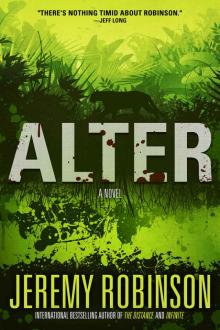 Alter
Alter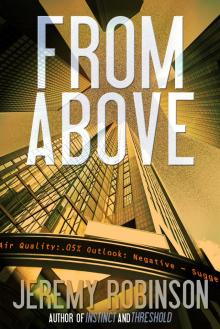 From Above - A Novella
From Above - A Novella Flux
Flux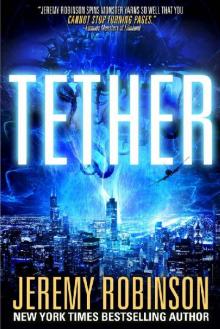 Tether
Tether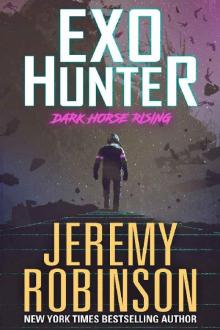 Exo-Hunter
Exo-Hunter Pulse
Pulse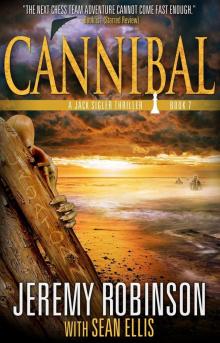 Cannibal
Cannibal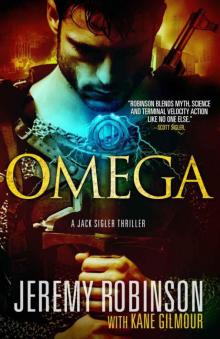 Omega: A Jack Sigler Thriller cta-5
Omega: A Jack Sigler Thriller cta-5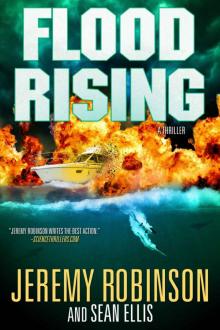 Flood Rising (A Jenna Flood Thriller)
Flood Rising (A Jenna Flood Thriller)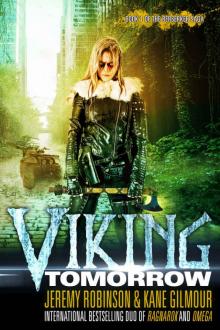 Viking Tomorrow
Viking Tomorrow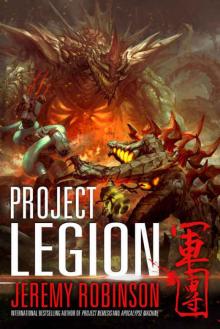 Project Legion (Nemesis Saga Book 5)
Project Legion (Nemesis Saga Book 5) BENEATH - A Novel
BENEATH - A Novel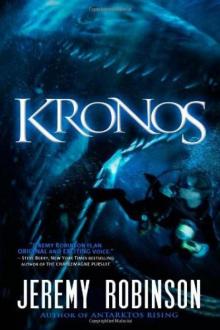 Kronos
Kronos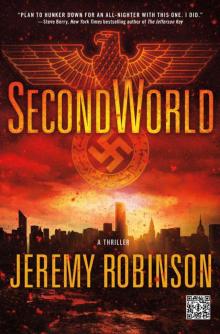 SecondWorld
SecondWorld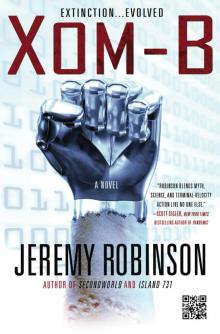 XOM-B
XOM-B Forbidden Island
Forbidden Island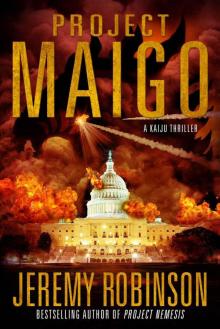 Project Maigo
Project Maigo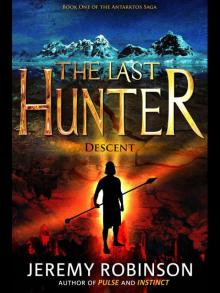 The Last Hunter - Descent (Book 1 of the Antarktos Saga)
The Last Hunter - Descent (Book 1 of the Antarktos Saga)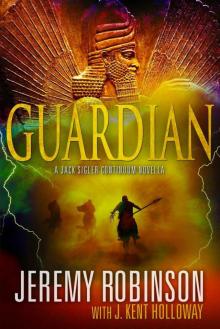 Jack Sigler Continuum 1: Guardian
Jack Sigler Continuum 1: Guardian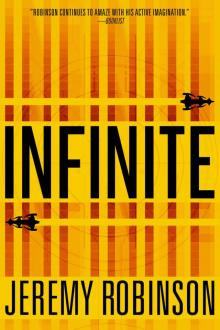 Infinite
Infinite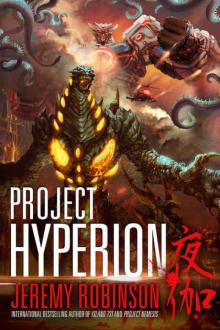 Project Hyperion
Project Hyperion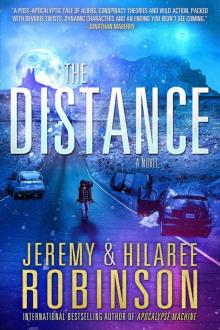 The Distance
The Distance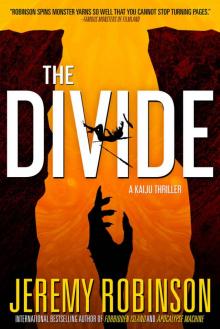 The Divide
The Divide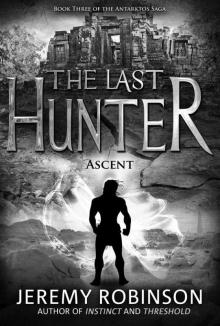 The Last Hunter - Ascent (Book 3 of the Antarktos Saga)
The Last Hunter - Ascent (Book 3 of the Antarktos Saga)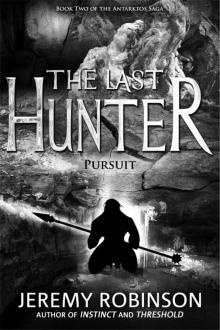 The Last Hunter - Pursuit (Book 2 of the Antarktos Saga)
The Last Hunter - Pursuit (Book 2 of the Antarktos Saga)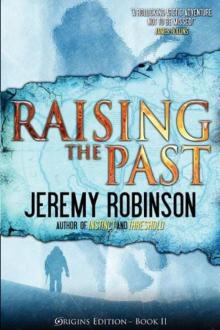 Raising the Past
Raising the Past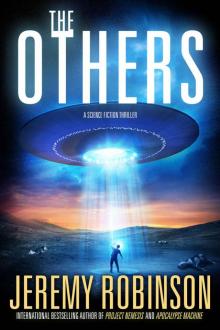 The Others
The Others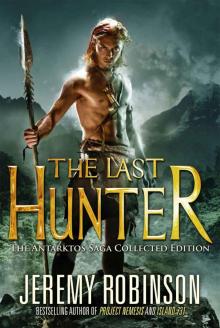 The Last Hunter - Collected Edition
The Last Hunter - Collected Edition Threshold
Threshold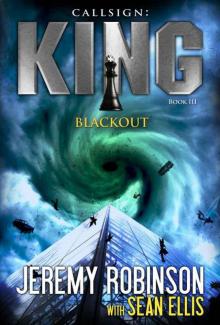 Blackout ck-3
Blackout ck-3 Antarktos Rising
Antarktos Rising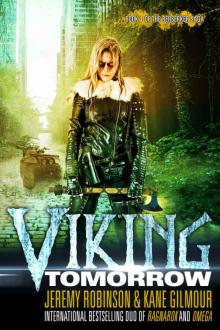 Viking Tomorrow (The Berserker Saga Book 1)
Viking Tomorrow (The Berserker Saga Book 1)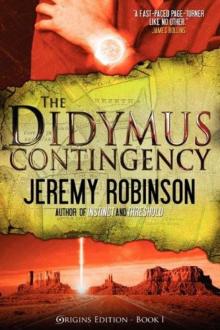 The Didymus Contingency
The Didymus Contingency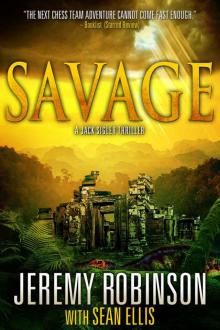 Savage (Jack Sigler / Chess Team)
Savage (Jack Sigler / Chess Team)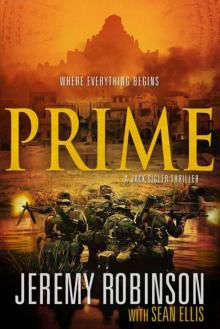 Prime
Prime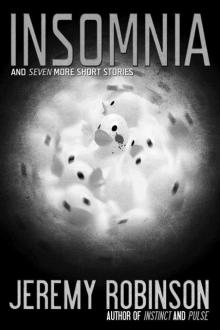 Insomnia and Seven More Short Stories
Insomnia and Seven More Short Stories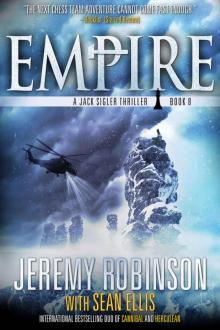 Empire (A Jack Sigler Thriller Book 8)
Empire (A Jack Sigler Thriller Book 8)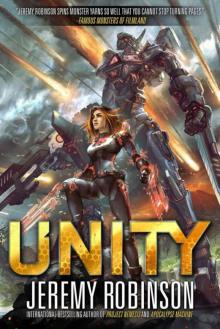 Unity
Unity Instinct
Instinct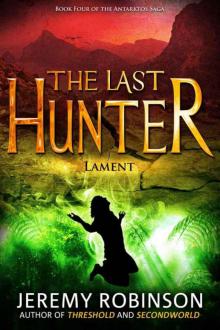 The Last Hunter - Lament (Book 4 of the Antarktos Saga)
The Last Hunter - Lament (Book 4 of the Antarktos Saga)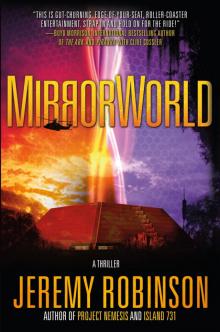 MirrorWorld
MirrorWorld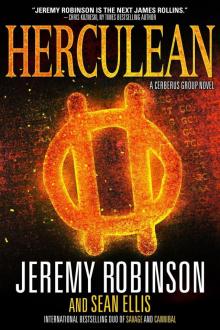 Herculean (Cerberus Group Book 1)
Herculean (Cerberus Group Book 1)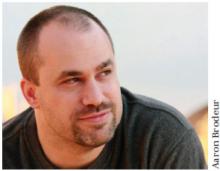 Island 731
Island 731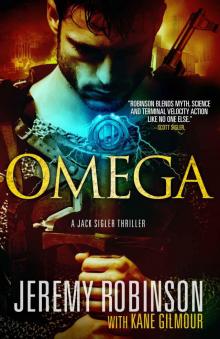 Omega: A Jack Sigler Thriller
Omega: A Jack Sigler Thriller Patriot (A Jack Sigler Continuum Novella)
Patriot (A Jack Sigler Continuum Novella)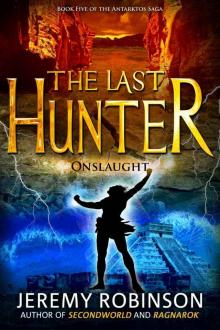 5 Onslaught
5 Onslaught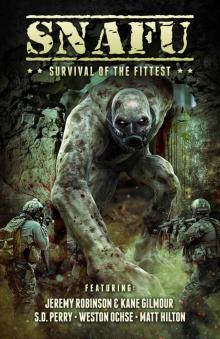 SNAFU: Survival of the Fittest
SNAFU: Survival of the Fittest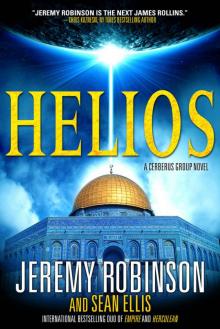 Helios (Cerberus Group Book 2)
Helios (Cerberus Group Book 2)